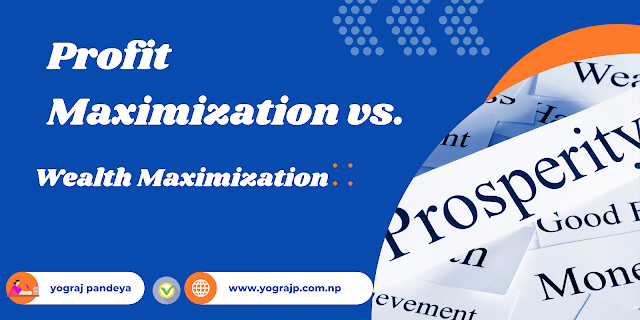Profit Maximization vs. Wealth Maximization
When the management of companies is encouraged to change their paradigm from traditional finance to strategic finance, they notice a lot of changes. One of the most prominent changes that are observed is with regards to the concept of wealth maximization. Many managers have the opinion that wealth management is a fad and will be replaced by another objective soon. However, this is not the case.
The concept of strategic financial management has existed for a couple of decades now and shareholder wealth maximization has remained constant. This is not a fad but a raison deter for organizations across the globe. In this article, we will have a closer look at why the maximization of shareholder wealth is a better objective than profit maximization.
The Pitfalls of Profit Maximization
Profit is calculated on a quarterly or an annual basis. This is almost no company in the world that calculates profit for a decade. This is the reason that profit maximization cannot be and should not be the objective of any business.
The very definition of profit maximization is such that it makes the organization short-sighted. The management becomes fixated with short-term numbers and makes decisions to ensure that they look good. However, short-term numbers can also be improved by unethical means. For instance, if a company pays its employees a lower salary as compared to its peers, it can improve its profitability numbers in the short run. However, in the long run, it will not be able to find a talented workforce and its future profits will suffer.
Wealth maximization changes the orientation of the company from the short term to the long term. Also, it needs to be noted that profit is not really an indisputable number. Companies can change their profit number by making changes to their accounting policy instead of improving the operations of the company. Also, the profits can be artificially inflated in the short run by making credit sales, a lot of which might end up being bad debts in the long run.
Why Wealth Maximization is Important?
As mentioned above, the profit maximization objective leads companies towards making wrong decisions in the short run. This is the reason that shareholder wealth maximization can be considered to be a better objective. The wealth of the company is the sum of the present value of the discounted cash flow which will accrue to the company over some time. Hence, to maximize the shareholder’s value, the company has to maximize its cash flow. Cash flow, unlike profit, cannot be manipulated. Also, the firm is considering the sum of cash flow over years. This is the reason that the company is forced to think about the long term. Value destroying decisions that create profit in the short run, but destroy value, in the long run, will be flagged if decisions are taken based on wealth maximization philosophy.
What about the Other Stakeholders?
The shareholder’s wealth maximization philosophy has faced a lot of criticism. This is because the critics believe that the interests of the shareholders are given priority over the interests of other stakeholders because of this model. Hence, they believe that the objective of the firm should be stakeholder value maximization. This will ensure that the employees, suppliers, debtors, and other stakeholders of the firm do not feel neglected. However, the policy of shareholder wealth maximization does not conflict with the policy of stakeholder wealth maximization. It needs to be understood that the wealth created for the stakeholders needs to be optimized whereas for shareholders, it needs to be maximized.
Consider a case where a company is trying to maximize customer value or employee value. Customer value can be maximized when the company starts giving away goods for free or even start paying the customers to use their goods! However, this will not be sustainable in the long run since the company will go bankrupt if it continues doing this for some time. Similarly, if the company starts maximizing employee value, then they will have to give huge sums of money to all their employees. Once again, this would make the system unsustainable as labor costs will go through the roof.
The fact of the matter is that it is impossible to maximize the value for other stakeholders. Hence, for them, the value needs to be optimized. This means that the stakeholders should be given a better deal than the competition is offering. Hence, employees must be paid more than the competition and customers must have to pay less than what they would have paid to the competition. If the firm optimizes the value creation for other stakeholders, it automatically maximizes the value for shareholders. This is because shareholders get the residual value and the residual value can be maximized if all the other stakeholders are paid fairly and the operations are run efficiently.
The Conclusion
The bottom line is that shareholder wealth maximization is not a selfish objective. Instead, it is an objective that sums up the well-being of all the parties involved. Hence, it is likely to stay for a long time and all the other objectives of strategic finance must be built using this objective as the base.
More:



